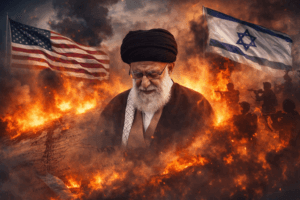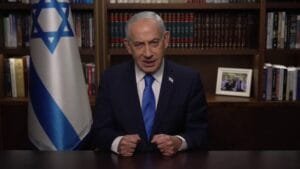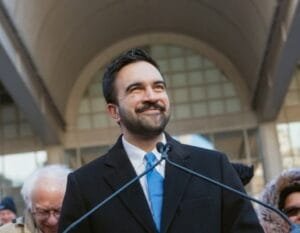Israeli PM Yair Lapid backs two-state solution at UNGA

Israeli Prime Minister Yair Lapid in his speech at the 77th UN General Assembly has expressed his support for a two-state solution to the Israeli-Palestinian conflict.
This term had been a fundamental principle that enjoyed a type of Israeli consensus. Other Israeli leaders had referred to it. Still, it has been largely absent from the public arena and discourse in recent years. Generating resounding headlines in Israel and beyond, Lapid declared at the UN that the two-state solution was the “right” way to resolve the conflict. “An agreement with the Palestinians, based on two states for two peoples, is the right thing for Israel’s security, for Israel’s economy and for the future of our children,” he said.

Was the effect of his maiden UN General Assembly (UNGA) address a shocking earthquake, or a storm in a teacup? Probably both.
Lapid’s vision, expressed as he campaigns for the Nov. 1 elections, has come in for widespread condemnation in Israel. As my colleague Mazal Mualem wrote, it is too soon to say whether it did Lapid more harm than good in terms of political impact. Diplomatically, however, from Lapid’s point of view, this was an important move, perhaps even a necessary one.
Lapid knows that Israel faces complex challenges to its security. He knows he will need every bit of international credit, especially from Washington, if and when he gives the order for Israeli troops to beef up their current counterterrorism campaign in the Palestinian towns and villages of the West Bank.
The same would apply in spades if clashes break out on Israel’s northern front with Hezbollah, which has been threatening Israeli gas production at the Karish drilling platform near the maritime border with Lebanon. Lapid knows he will need all the credit he can raise in case the threats materialize.
The Israeli prime minister believes that presenting himself as a peace-seeking, responsible leader willing to take a courageous stand on Israel’s future despite the political risks involved would provide him with the carte blanche he needs. That was one thrust of his UNGA address.
In the short term at least, Lapid got what he was after. Shortly after the speech, US President Joe Biden quoted Lapid’s key sentence, tweeting, “I welcome Israeli Prime Minister Lapid’s courageous statement at the UN General Assembly: ‘An agreement with the Palestinians, based on two states for two peoples, is the right thing for Israel’s security, for Israel’s economy and for the future of our children.’ I could not agree more.” US Ambassador to Israel Thomas Nides also hailed the courageous speech by Lapid.
The diplomatic considerations, however, were not the only ones at play. Lapid, currently Israel’s caretaker prime minister running for a permanent position in the upcoming elections, is conducting a “I am not Benjamin Netanyahu” campaign.
Unlike the former prime minister, who is seeking a comeback with a fear-mongering, negative campaign, Lapid refuses to be drawn into political mudslinging and wrangling, neither with the Netanyahu right-wing and ultra-Orthodox bloc of parties nor with the center-left parties that are his current coalition partners. By declaring his support for the two-state solution, Lapid is seeking to differentiate himself from his nemesis, not just in terms of style but also in policy and values.
A leader, Lapid has been telling his people, must tell the truth even when it is not popular, politically risky and does not serve his interests. The truth as Lapid sees it, and which he has voiced in the past, is that a two-state solution is the only way to resolve the conflict and ensure Israel’s continued Jewish majority.
Lapid is not naive. He knows this is not a currently feasible stand, and does not delude himself or his listeners into thinking Israel is about to resume the long dormant negotiations with the Palestinians. Neither side, exhausted by years of failed talks, is ripe for such a pivotal step. Nonetheless, Lapid argues, one must concede there is no other viable solution. Israel must pursue peace and be willing to take risks to achieve it, even if only in rhetoric, for now.
His partners in the center-left and center-right political bloc are furious at Lapid.
The left-wing Meretz party is convinced that his Sept. 22 two-state declaration was designed to poach its voters and bury its prospects of making it into the Knesset. Labor views his UN speech much the same way — as a move meant mostly to mobilize votes for his centrist Yesh Atid party, which is polling at 23-25 Knesset seats, far more than its allied parties.
The center-right National Unity alliance led by Defense Minister Benny Gantz is particularly incensed, claiming that rather than bolstering the prospects of the other parties in his bloc, Lapid is seeking to destroy them in order to remain head of the biggest party in the anti-Netanyahu bloc, even at the expense of efforts to block Netanyahu’s return. Until now, Lapid has been staying out of this in-fighting. Everyone knows who the leader of the bloc is, he tells his followers.
Lapid is also dealing with the fallout from the split announced earlier this month in the Arab Joint List, which has provided the Netanyahu camp with significant tailwind, as reflected in the latest polls, showing a plunge in Arab voter turnout. The poor turnout is thought to be the result of loss of faith in the Israeli political system and disappointment with the breakup of the Arab Joint List, which garnered an unprecedented 15 Knesset seats in the 2020 elections. Voters intend to express their displeasure by staying home Nov. 1.
Unless the Arab voter turnout rises, Lapid can pack up and vacate the prime minister’s office in early November after less than five months in office. His statement of support for the two-state vision was supposed to energize the Arab Israeli electorate to some degree, but more to the point was Lapid’s mentions of the role Israel’s 21% Arab minority plays in the life of the country.
Although not yet willing to commit to their full political inclusion in the government, Lapid spoke extensively in his speech about the Arab Israelis’ contribution to society and the economy as well as to their historic and unprecedented participation in the current coalition government he heads, saying his government even has “Arab ministers,” a reference to Issawi Freij of the predominantly Jewish Meretz party who serves as minister of regional cooperation.
Who did not rate a mention in Lapid’s speech? Palestinian President Mahmoud Abbas. Lapid did not address him and did not mention his name, for good reason.
First, because such a move could have harmed Abbas himself, who is at a nadir of his popularity among the Palestinian public. Second, because Israel does not view the elderly leader as a partner for peace negotiations, and is instead waiting to see the developments of a post-Abbas era and the nature of the future Palestinian leadership.
One scenario being discussed in Israel is the collapse of the Palestinian Authority following Abbas’ demise. The question now is what will come first: the end of the Abbas era or the end of Lapid’s term as prime minister of Israel.














